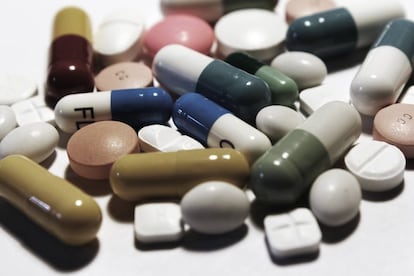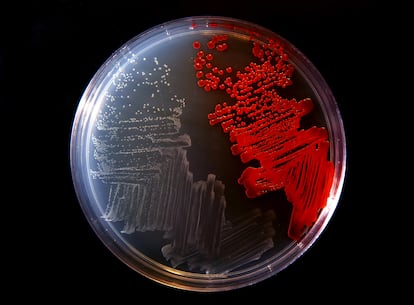Study suggests use of antidepressants generates resistance to antibiotics
New research has found a link between the use of these drugs and the loss of effectiveness of antibacterials

The discovery in the second half of the 20th century of many of the antibiotics we use today dispelled the fear of many once-lethal infectious diseases. However, while bacteria were temporarily defeated, they have continued to evolve, and in doing so building up resistance to the drugs designed to stop them. In 2016, a report estimated that super-resistant microbes kill around 700,000 people each year worldwide, while predicting that this number could reach 10 million by 2050. On Monday, a paper published in the scientific journal PNAS suggested that, in addition to antibiotics, a boom in the use of other drugs such as antidepressants may accelerate the growth of the problem.
The consumption of antidepressants has skyrocketed in recent years almost everywhere in the world. In Spain, between 2020 and 2021, there was a 10% increase and in Mexico, use of antidepressants and anxiolytics doubled during the pandemic. In the study published on Monday, a team of researchers led by Jianhua Guo, from the University of Queensland, Australia, observed how E. coli bacteria respond when exposed to commonly used antidepressants in laboratory samples. The microbes felt threatened and responded by accelerating their usual rate of mutation in the hope that by doing so, a solution to this existential threat would appear. In addition, the researchers also witnessed an increase in horizontal gene transfer during this battle, another factor that increases resistance.
In the study, exposure to antidepressants for 60 days reduced the susceptibility of bacteria to antibiotics, but in some cases, such as with sertraline, the effects were apparent after just one day of interaction. The results suggest that drugs designed to treat mental health conditions may aggravate the loss of effectiveness of antibiotics, a major global health problem.
Over-the-counter drugs
Microbiologist Bruno González Zorn, director of the Antimicrobial Resistance Unit at the Complutense University of Madrid (UCM), acknowledges that not much attention was being paid to this type of interaction, but the results do not surprise him. “We had already linked this mechanism of reaction to stress, whereby bacteria increase the mutations in their genome, to resistance to antibiotics,” he says, adding that there are many substances that can be introduced to bacteria in the laboratory that cause the microorganisms to stress and generate a similar response. “Another matter is the repercussions that these mechanisms might have on the generation of resistance at a global level. Now, it is necessary to investigate whether the part of the population that regularly consumes antidepressants really has a microbiota that is significantly more resistant to antibiotics than the rest of the population,” says González Zorn.
After reading the article, González Zorn decided to check if there was any correlation between the different levels of consumption of antidepressants in European Union countries and levels of antibiotic resistance, but found none. Such a correlation, however, does exists when other factors are taken into consideration, such as the number of drugs consumed without prescription.
María del Mar Tomás, a microbiologist at the Hospital de La Coruña, explains that researchers who study resistance to antibiotics have known for some time that “in addition to the resistance mechanisms that are generated against an antibiotic, there are other global mechanisms that can be generated by exposure to other substances or even by the lifestyle that a person leads. Now, it would be necessary to see if the same results that have been seen [in cell cultures] can be reproduced in vivo, in animal models, and see other effects, such as what happens with the microbiome.” In Tomás’ view, knowledge about these general mechanisms of bacterial reaction to stress can be used to produce new antibiotics that can block this manner of responding to threats and overcome current resistance mechanisms.

The lead author of the research, Jianhua Guo, acknowledges the need for further experiments to confirm the relevance of the results by studying a wider variety of bacteria and testing on animals. On how to avoid the creation of antidepressant resistance if their role is confirmed to be important, Guo believes that “since the main reason for antibiotic resistance caused by antidepressants is associated with the oxidative capacity of these drugs, it is possible that adding antioxidants would prevent these effects.”
Guo’s team had already conducted similar research in which they found other drugs that produce similar stress reactions in bacteria, such as anti-inflammatory drugs or the antibacterial triclosan, which is present in toothpaste and some soaps. The researcher also raises the possibility that drugs including antidepressants wind up in the environment and interact naturally with bacteria, facilitating the emergence of resistance. As the Queensland team stated in a previous study, up to 11% of the fluoxetine consumed ends up in the natural environment via drainage systems.
Although it is still too early to say whether antidepressants promote antibiotic resistance in the real world, exploring such phenomena is one way of identifying more potential routes by which one of the major global health problems facing humankind today could worsen in the coming decades, and to adjust accordingly. Biocides such as zinc oxide, which has been used to control post-weaning diarrhea in pigs, have been banned after their role in generating antibiotic resistance was proven.
Sign up for our weekly newsletter to get more English-language news coverage from EL PAÍS USA Edition
Tu suscripción se está usando en otro dispositivo
¿Quieres añadir otro usuario a tu suscripción?
Si continúas leyendo en este dispositivo, no se podrá leer en el otro.
FlechaTu suscripción se está usando en otro dispositivo y solo puedes acceder a EL PAÍS desde un dispositivo a la vez.
Si quieres compartir tu cuenta, cambia tu suscripción a la modalidad Premium, así podrás añadir otro usuario. Cada uno accederá con su propia cuenta de email, lo que os permitirá personalizar vuestra experiencia en EL PAÍS.
¿Tienes una suscripción de empresa? Accede aquí para contratar más cuentas.
En el caso de no saber quién está usando tu cuenta, te recomendamos cambiar tu contraseña aquí.
Si decides continuar compartiendo tu cuenta, este mensaje se mostrará en tu dispositivo y en el de la otra persona que está usando tu cuenta de forma indefinida, afectando a tu experiencia de lectura. Puedes consultar aquí los términos y condiciones de la suscripción digital.









































